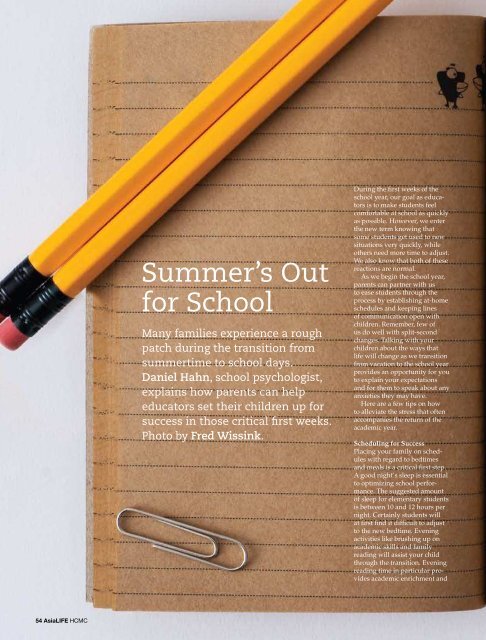Brett Davis - AsiaLIFE Magazine
Brett Davis - AsiaLIFE Magazine
Brett Davis - AsiaLIFE Magazine
You also want an ePaper? Increase the reach of your titles
YUMPU automatically turns print PDFs into web optimized ePapers that Google loves.
Expect that you may initially<br />
encounter tears or misbehaviour<br />
after school. These are common<br />
stress-related responses<br />
Summer’s Out<br />
for School<br />
Many families experience a rough<br />
patch during the transition from<br />
summertime to school days.<br />
Daniel Hahn, school psychologist,<br />
explains how parents can help<br />
educators set their children up for<br />
success in those critical first weeks.<br />
Photo by Fred Wissink.<br />
During the first weeks of the<br />
school year, our goal as educators<br />
is to make students feel<br />
comfortable at school as quickly<br />
as possible. However, we enter<br />
the new term knowing that<br />
some students get used to new<br />
situations very quickly, while<br />
others need more time to adjust.<br />
We also know that both of these<br />
reactions are normal.<br />
As we begin the school year,<br />
parents can partner with us<br />
to ease students through the<br />
process by establishing at-home<br />
schedules and keeping lines<br />
of communication open with<br />
children. Remember, few of<br />
us do well with split-second<br />
changes. Talking with your<br />
children about the ways that<br />
life will change as we transition<br />
from vacation to the school year<br />
provides an opportunity for you<br />
to explain your expectations<br />
and for them to speak about any<br />
anxieties they may have.<br />
Here are a few tips on how<br />
to alleviate the stress that often<br />
accompanies the return of the<br />
academic year.<br />
Scheduling for Success<br />
Placing your family on schedules<br />
with regard to bedtimes<br />
and meals is a critical first step.<br />
A good night’s sleep is essential<br />
to optimizing school performance.<br />
The suggested amount<br />
of sleep for elementary students<br />
is between 10 and 12 hours per<br />
night. Certainly students will<br />
at first find it difficult to adjust<br />
to the new bedtime. Evening<br />
activities like brushing up on<br />
academic skills and family<br />
reading will assist your child<br />
through the transition. Evening<br />
reading time in particular provides<br />
academic enrichment and<br />
may hasten sleep. Decreasing<br />
the time allotted for television,<br />
movies and video games may<br />
also prove an effective signal of<br />
the return to school responsibilities.<br />
Dealing with Dawdling<br />
With regard to the logistics of<br />
the morning routine, it may be<br />
helpful to view yourself as the<br />
"getting out of the door" coach.<br />
Consider having your children<br />
make choices about tomorrow’s<br />
school clothes at night. In addition,<br />
choosing a pre-set, easily<br />
accessible place for backpacks<br />
may ameliorate the morning<br />
rush. As the year begins, you<br />
may find your youngster making<br />
less than positive comments<br />
about getting up early or going<br />
to school. It is best to ignore any<br />
negativity. Instead, direct the<br />
morning routine with a smile<br />
on your face. Keep reminders<br />
brief and to the point ("Shoes."<br />
"Backpack.") or consider using<br />
open-ended questions ("What<br />
do you need to do next?"). If<br />
dawdling persists, use natural,<br />
logical consequences. Wake<br />
them earlier if they need more<br />
time. If they speed up their<br />
routine, then allow a later wake<br />
up. You can also follow through<br />
with an earlier to-bed time.<br />
Don’t bribe your children; allow<br />
them to earn privileges for demonstrating<br />
responsibility.<br />
Employing Incentives<br />
For the more forgetful child or<br />
one who has difficulties with<br />
settling into a routine, a star<br />
chart may be helpful. A star<br />
chart is essentially a checklist of<br />
those morning tasks organized<br />
on a grid of lines divided into<br />
days of the week. They can be<br />
photocopied and put on a clipboard<br />
and placed in a prominent<br />
place in your home. Once<br />
the child completes the tasks,<br />
they can be checked off (or you<br />
can use a smiley face). Children<br />
can earn extra privileges or a<br />
toy based on their performance.<br />
Oftentimes dawdling is simply<br />
due to younger children having<br />
not yet internalized a sense of<br />
time. The use of a kitchen timer,<br />
for example, can be helpful.<br />
Easing Academic Anxiety<br />
Many children may experience<br />
anxiety about the bus, their<br />
classmates, their teacher and<br />
how they will perform in school.<br />
This is normal, and reassurance<br />
from parents is key to increasing<br />
their confidence. If your child<br />
in some way indicates concern<br />
about the school year, provide<br />
an opportunity for them to talk<br />
about their feelings. Ask openended<br />
rather than yes/no questions.<br />
Use reflective listening<br />
and paraphrasing, and be empathic.<br />
Acknowledge their feelings<br />
and offer encouragement.<br />
Reassure your child that his<br />
or her classmates are all trying<br />
to settle in after summer and/<br />
or get used to a new school. Be<br />
aware of your own feelings and<br />
anxieties as children often reflect<br />
parental concerns. Exude confidence<br />
when you say goodbye to<br />
your children.<br />
Coping with School-Related<br />
Stress<br />
If you haven’t already, state<br />
your expectations for behaviour<br />
and completing class/homework<br />
assignments. Expect that<br />
you may initially encounter<br />
tears or misbehaviour after<br />
school. These are common<br />
stress-related responses. Do<br />
not overreact unless patterns<br />
of behaviour persist after<br />
several weeks. Be proactive and<br />
talk to the classroom teacher<br />
and school counselors. Many<br />
students are over-scheduled,<br />
and it’s important to help them<br />
pace themselves during the<br />
beginning of the school year,<br />
especially while it is still hot<br />
and humid. Consider minimizing<br />
home and extracurricular<br />
activities during the first part<br />
of the term if necessary, and<br />
allow time for free play. Increase<br />
responsibilities and activities as<br />
your child settles into the school<br />
routine.<br />
As we progress through the<br />
school year, your child’s teacher,<br />
counselor and administrators<br />
all work together to support the<br />
academic and emotional development<br />
of students. Best of luck<br />
to you and your family with the<br />
2010-11 school year!<br />
54 asialife HCMC asialife HCMC 55















